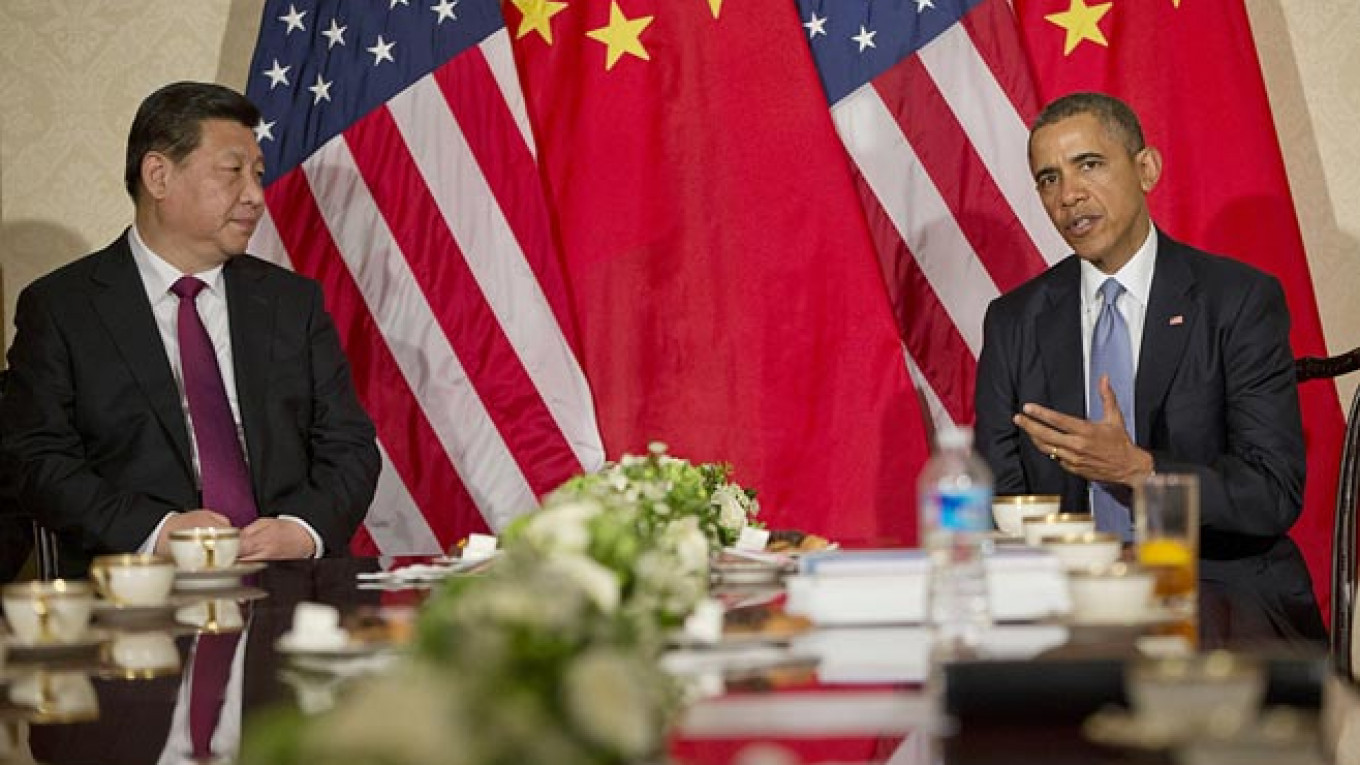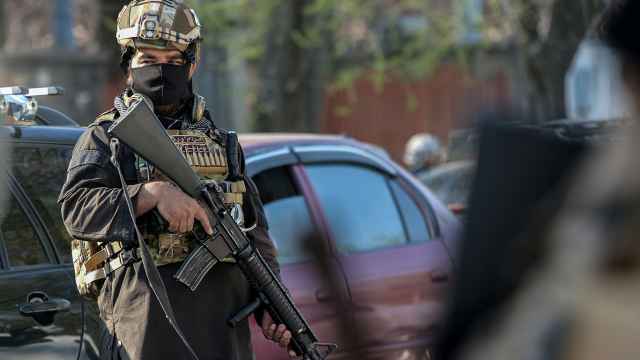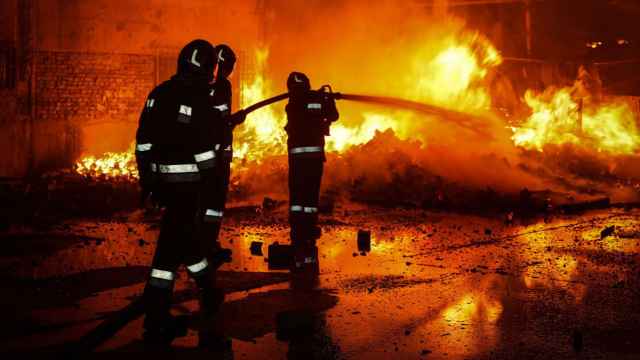U.S. President Barack Obama on Monday began negotiations with European leaders over Russia's actions in Crimea, as Russia tightened its grip on the region and Defense Minister Sergei Shoigu met with troops there.
As two-day talks between leaders of the Group of Seven leading industrialized nations in The Hague opened Monday, the West continued to criticize Russia for its takeover of Ukraine's Crimean peninsula last week. The move prompted the U.S. and the European Union to impose sanctions on Russian individuals, including some of President Vladimir Putin's closest allies, and on Monday the White House threatened further sanctions if the situation escalated.
But in a sign that Crimea was now firmly under Russia's control, Shoigu inspected the troops in the peninsula and met with Rear Admiral Denis Berezovsky, one of a handful of Ukrainian officers to switch allegiances to Russia's Black Sea Fleet before the official annexation.
"The most important thing is that there not be any interim period when there is an absence of authority, so that military hardware does not fall into the wrong hands," said Shoigu to top military commanders, Reuters reported.
He also met with Crimea's new pro-Moscow authorities. Earlier in the day, Russian Interior Minister Vladimir Kolokoltsev also paid the peninsula a visit, saying that former members of Ukraine's riot police — blamed for killing protesters during the unrest that sparked Viktor Yanukovych's ouster — would be integrated into Russia's police force.
The visit to Crimea by senior Russian officials came as talks between Western leaders were underway in he Hague. As the talks opened, the White House issued a statement warning of a buildup of Russian troops on Ukraine's border and threatening wider sanctions if Russia did not back down.
Britain's Prime Minister David Cameron joined in the chorus of disapproval of Russia's actions, saying it was "absolutely clear" that the Group of Eight summit scheduled in Russia this year was off.
Russia's membership in G8 has effectively been suspended in light of the Ukraine situation.
Russia, meanwhile, reacted to "the unacceptable action by the Canadian side" of imposing sanctions on Moscow with its own retaliatory sanctions.
Russia's Foreign Ministry said in a statement that the sanctions would target Canadian Prime Minister Stephen Harper's aides Christine Hogan and Wayne Wouters, as well as several lawmakers.
Amid the continued saber-rattling, Obama's trip to The Hague was widely seen as a bid to rally support for further isolating Russia from the international community.
"Europe and the U.S. are united in our support of the Ukrainian government and the Ukrainian people," Obama said after a meeting with Dutch Prime Minister Mark Rutte on Monday.
"We are united in imposing a cost on Russia for its actions so far. Prime Minister Rutte rightly pointed out yesterday the growing sanctions would bring significant consequences to the Russian economy," Obama said.
On Monday, Obama also held one-on-one talks on the Ukraine crisis with Chinese President Xi Jinping, who in the past has often sided with Russia in international disputes.
"I believe ultimately, that by working together, China and the U.S. can help strengthen international law and respect for the sovereignty of nations and establish the kind of rules internationally that allow all peoples to thrive," the U.S. leader said.
Meanwhile, in an interview published in Monday's edition of Dutch newspaper De Volkskrant, Obama struck a conciliatory note.
"The U.S. does not view Europe as a battleground between East and West, nor do we see the situation in Ukraine as a zero-sum game," he said. "That is the kind of thinking that should have ended with the Cold War."
The Ukrainian people did not have to choose between "East and West," he said, adding that they should have equally good relations with Russia, the U.S. and Europe.
But he reiterated that the U.S. would impose further sanctions if Russia continued to escalate the situation in Ukraine.
Last week, the U.S. imposed asset freezes and travel bans on 20 Russian individuals, including some of Putin's closest associates. It also warned that further sanctions could include a ban on U.S. trade with entire sectors of the Russian economy.
Vitaly Kulik, head of Ukraine's Center for Civil Society Research, said by phone that new sanctions would likely be imposed if the situation in southeastern Ukraine got out of control.
That could happen if pro-Kremlin activists continued to seize administrative buildings and insisted on holding referendums on federalizing Ukraine or joining Russia, he said, adding that he did not rule out a Russian military invasion either.
"New sanctions are possible if there is no serious dialogue about Crimea's future [between Russia and Ukraine]," he said.
The Kremlin's control over Crimea was finalized as Russian troops stormed one of the last remaining military facilities in Crimea early on Monday — a Ukrainian marine base in the city of Feodosiya. The Associated Press reported that up to 80 Ukrainian servicemen had been detained.
Oleksandr Turchynov, acting president of Ukraine, said Monday that the country would withdraw its forces out of Crimea because of "threats to the lives and health of our servicemen."
Apart from further advancing in Crimea, Russian authorities also continued their criticism of the Ukrainian government.
Russia's Foreign Ministry said Monday that "ultranationalists" had been checking passports on a train in the city of Vinnitsa and extorting money and jewelry from holders of Russian passports.
"That is the kind of rule of law that is currently emerging in Ukraine!" the ministry said.
Ukrainian Railways denied the report, however, saying that the incident in question had been a legitimate check of the train by police officers in response to a reported theft, not harassment by ultranationalists.
Ukraine's Foreign Ministry accused Russia of deliberate "disinformation" over the report.
Contact the author at o.sukhov@imedia.ru
A Message from The Moscow Times:
Dear readers,
We are facing unprecedented challenges. Russia's Prosecutor General's Office has designated The Moscow Times as an "undesirable" organization, criminalizing our work and putting our staff at risk of prosecution. This follows our earlier unjust labeling as a "foreign agent."
These actions are direct attempts to silence independent journalism in Russia. The authorities claim our work "discredits the decisions of the Russian leadership." We see things differently: we strive to provide accurate, unbiased reporting on Russia.
We, the journalists of The Moscow Times, refuse to be silenced. But to continue our work, we need your help.
Your support, no matter how small, makes a world of difference. If you can, please support us monthly starting from just $2. It's quick to set up, and every contribution makes a significant impact.
By supporting The Moscow Times, you're defending open, independent journalism in the face of repression. Thank you for standing with us.
Remind me later.






